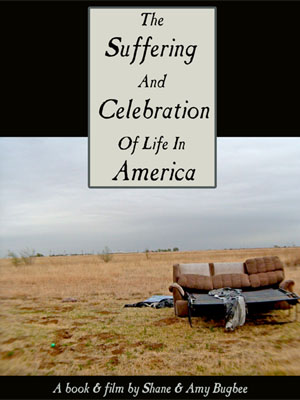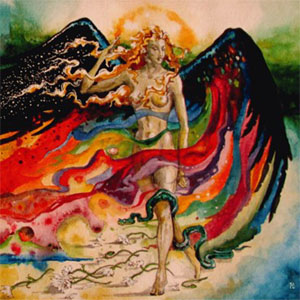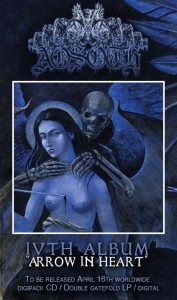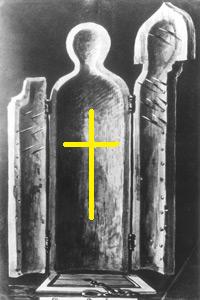The Suffering and Celebration of Life in America
by Shane and Amy Bugbee
532 pages, $50 (direct: paperback $25 ebook $10)
 Shane and Amy Bugbee are no strangers to controversy. Shane helped produce the original Milwaukee Metalfests, then ran several of his own Expo of the Extreme shows, while publishing classic Ragnar Redbeard texts with intros by Anton LaVey and running a radio show called Radio Free Satan with the blessing off the occult community.
Shane and Amy Bugbee are no strangers to controversy. Shane helped produce the original Milwaukee Metalfests, then ran several of his own Expo of the Extreme shows, while publishing classic Ragnar Redbeard texts with intros by Anton LaVey and running a radio show called Radio Free Satan with the blessing off the occult community.
In addition, the Bugbees put fingers into about every pie in the outsider art community, from banned comic book artist Mike Diana to — well, evil metal, now that you mention it. Their book The Suffering and Celebration of Life in America is a tour of the USA to discover its roots, but it’s also a series of interviews with some of metal’s greatest minds.
Originally, Shane and Amy Bugbee, a married pair of artists and entrepreneurs, planned an adventure called A Year at the Wheel where they would drive the length and breadth of the United States during an election year and record what they saw.
Luckily these artists are also metalheads and so decided to visit with a number of classic figures in the underground or related scenes. They interviewed Jeff Becerra (twice), Ian Mackaye (Minor Threat), Averse Sefira, the West Memphis 3, metal artist Jeff Gaither, and Gene Hoglan (Dark Angel).
These interviews tend to be in-dept explorations of the motivations behind metal artists, and include a number of statements that are crushing in their honesty and profundity. In many ways, they showcase the best of metal when all of the rock-star impositions are removed.
For example, take this selection from Averse Sefira:
Some people think the only real difference between black metal and other forms of metal is the fact that you wear corpse paint and that you scream instead of growl. That’s really, really short sighted. You look at a band like Emperor. You could not write a song like ‘I Am The Black Wizards’ in death metal or thrash or anything like that. You could not write a song like ‘Blashyrkh’ the song that Immortal did in any other genre but black metal. It wants to transcend and that is why we are involved in it. (307)
Interview questions become interesting as the Bugbees interrogate their subjects about historical mysteries, and in doing so, lay bare to some of the vital issues conflicting them. For example, Jeff Becerra (Possessed) on his Satanism and censorship:
We had to take the upside down cross off of the second and third records, well we didn’t, the record company did. We actually toned down the Satanism for the second and third because it was the bonfire of the vanities, the Christians were throwing books on the fire and burning shit up that might be important. People’s moms were making them switch to catholic school cause they were getting caught with shit, like it was drugs, people were afraid of Satan then, no one is scared of Satan now… It’s a trip because if people find spirituality without fear it’s gonna be okay. Life is
scary enough at this point in time, we don’t need to put metaphysical boogie men in our children’s heads. (445)
Not all of the interviews are metal per se, but it’s hard to deny the influence of Minor Threat on underground bands who came after them. Much as punk is different than metal however, the punk outlook as expressed by Ian Mackaye (Minor Threat) is less metaphysical and more political — in fact, this may be the most significant difference between metal and punk, now that I think about it:
In my mind, at least in our culture, the overriding emphasis is on profit and wealth. I think it’s actually the modern form of power. Before there were royalty and kings, or this guy has the biggest knife and cuts off more people’s heads. Now the warriors, the really powerful people are the rich people, and profit is so dominating in all business conversations. (514)
What makes these interviews interesting (outside of the content) is that they are not in a fanzine. This is a book about driving across America to figure out what it’s all about. The goal was to discover it, and themselves, for the authors. In doing so, by approaching many classic musicians from non-standard angles, they captured a lot of what motivated them.
In addition, the Bugbees are no strangers to the type of experience that a metalhead has in a society that, whether motivated by Jesus or money or something else, doesn’t like the disobedient and too smart to conform and get in line for the easy jobs and abundant shopping. In their case, it was a professed interest in Satanism, horror movies, metal and pornography that attracted negative attention.
In America’s heartland, they had to abandon a town and a successful business when a “poison pen letter” outed them as the authors of several atheistic and not-so-very-Jesus blogs that might have endorsed Satanism. Along their trip, they lost other jobs too, as well as non-profit opportunities. In a few cases, they almost lost friends or other contacts but were able to rescue the situation.
Wherever they went, these accusations seemed to follow them. It would make anyone paranoid. It explains what so many metalheads feel in this society, which is that the instant it identifies us as outsiders, it goes on the offensive. We are seen as a threat to its way of life, whether it be conservative and Christian or politically correct and urban.
For this and other interesting explorations of what it is to be an outsider, The Suffering and Celebration of Life in America is a great read for anyone who has stepped outside of the mainstream, and wants to find a reason not just to be outside, but to celebrate it.
7 CommentsTags: averse sefira, gene hoglan, minor threat, possessed
 Mark your virtual calendar for Fri, February 22, 6:05 PM EET (which translates to 10:05 AM Central time here in the States) for a live concert which will be streaming over the internet to your screen.
Mark your virtual calendar for Fri, February 22, 6:05 PM EET (which translates to 10:05 AM Central time here in the States) for a live concert which will be streaming over the internet to your screen. After years of people wondering about the connections between metal and literature, a thoughtful university professor listened to his students and as a result,
After years of people wondering about the connections between metal and literature, a thoughtful university professor listened to his students and as a result, 
 Shane and Amy Bugbee are no strangers to controversy. Shane helped produce the original Milwaukee Metalfests, then ran several of his own Expo of the Extreme shows, while publishing classic Ragnar Redbeard texts with intros by Anton LaVey and running a radio show called Radio Free Satan with the blessing off the occult community.
Shane and Amy Bugbee are no strangers to controversy. Shane helped produce the original Milwaukee Metalfests, then ran several of his own Expo of the Extreme shows, while publishing classic Ragnar Redbeard texts with intros by Anton LaVey and running a radio show called Radio Free Satan with the blessing off the occult community.
 A tension has been simmering under the surface in metal for the better part of a decade now and shows no signs of calming down. It concerns the division of metal into old and new.
A tension has been simmering under the surface in metal for the better part of a decade now and shows no signs of calming down. It concerns the division of metal into old and new. A couple of years ago, a venture capitalist and a former investment banker realized that to succeed in business, a startup needs “a fantastic story and a vision, mastery of its craft and must ‘trigger basic human instincts'”.
A couple of years ago, a venture capitalist and a former investment banker realized that to succeed in business, a startup needs “a fantastic story and a vision, mastery of its craft and must ‘trigger basic human instincts'”. Rachmaninov was born in Russia in 1873 and died in 1943. After the Russian Revolution, he spent most of his time in the US and Europe. He’s known as a late Romanticist while Modern styling was becoming prominent. He’s widely considered a virtuoso on piano, which his piano concertos have become standard in classical music performance.
Rachmaninov was born in Russia in 1873 and died in 1943. After the Russian Revolution, he spent most of his time in the US and Europe. He’s known as a late Romanticist while Modern styling was becoming prominent. He’s widely considered a virtuoso on piano, which his piano concertos have become standard in classical music performance.
